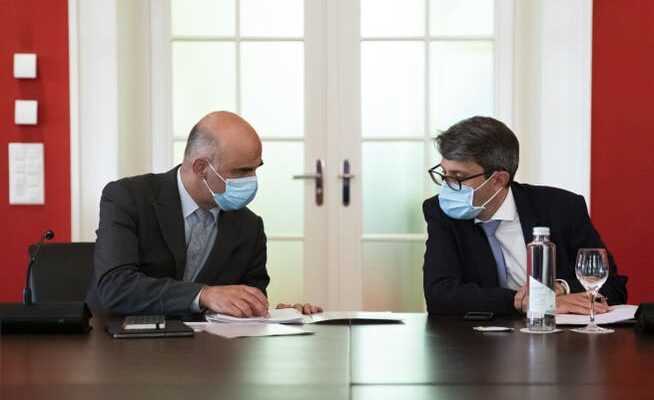The federal government and the cantons do not agree on who should intervene if the number of cases increases again. But the Federal Council has no desire to discuss the matter.
Federal Councilor Alain Berset and Lukas Engelberger, President of the Conference of Cantonal Health Directors.
It sounded so good. A joint paper, unanimously approved by the Federal Council and the cantonal governments, should determine the responsibilities for further dealing with the corona virus. Often enough during the pandemic, the two levels of government have argued about who is responsible for what. In autumn 2020, the federal black Peter game had serious consequences in the form of the second corona wave with its many fatalities. In order to avoid further quarrels, they wanted to clarify the rules of the game for the next few months in a joint paper.
Nothing will come of it. On Wednesday, the Federal Council decided to adopt the document – but not together with the cantons, but as a unilateral declaration of intent by the federal government. It had already been shown in advance that a clear majority of the cantonal governments did not agree with the paper from the department of Health Minister Alain Berset. In the consultation, they called for major corrections. They primarily demanded that the federal government continue to assume a greater part of the responsibility should the number of cases increase again.
In view of the open differences, one could have expected that Federal Councilor Berset and the cantons would discuss the issue and negotiate a compromise. But that’s not the case now. The Federal Council actually decided on Wednesday to let the matter run without clearing up the ambiguities.
Cantons should coordinate
This leaves one question above all unanswered: Who has to act if, for example, there is another increase in infections in late summer? From the point of view of the Federal Council, the cantons clearly have an obligation. Mandatory masks, bans on events, mandatory certificates, closures: From now on, all these measures should be decided by the cantons alone if the situation requires it. The Federal Council also thinks that it would not make sense to only impose a mask requirement in individual cantons. Nevertheless, he rejects his own responsibility. Instead, he calls on the cantons to coordinate regionally or nationwide.
The Federal Council does not categorically rule out having to become active again itself. However, he sets the hurdles relatively high: According to his paper, a “particularly severe pandemic wave” must break out in the country, which puts a greater strain on the health system than all previous waves, so that federal Berne would at most take uniform measures again. The Federal Council wants to deal with everything below this limit according to the rules of the “normal situation”, which means that the cantons alone are responsible.
Differences are to be expected
The cantons do not agree with this. The Conference of Health Directors (GDK) reminds that the individual cantonal governments decide independently when they want to introduce which measures. The GDK wants to improve coordination. In particular, it is planned that in future it will be able to recommend measures if the situation deteriorates throughout Switzerland or nationally. However, it is hardly to be expected that these suggestions will be followed everywhere. Cantonal differences are still “possible and probable”, according to the GDK in a statement.
Conclusion: One cannot claim that Switzerland is going into the third summer with the corona virus with a clear concept. In the best case, it doesn’t matter. In the worst case, there will probably be hectic back and forth again, with threats and pressure attempts, until it is clear who will (not) intervene.
